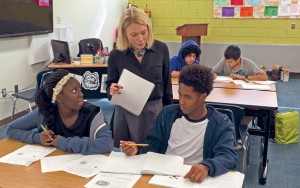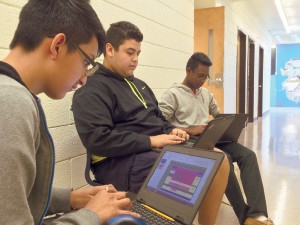Students at the Norwalk High School Early College Academy are joining IBM with a rapidly spreading, tech-focused academic model incorporating essential skills from the professional and collegiate worlds into standard high school curriculum.
“This is the wave of the future,” Karan Amaker, director of the Norwalk academy, said.
Known as P-TECH, the Pathways in Technology Early College High School model is a free and open process combining four years of high school with college-level courses in several fields including computer networking, software engineering, cybersecurity and web development, allowing students the opportunity to earn a two-year college degree. The course work is “mapped” to the skills and qualities companies like IBM need most and students work closely with IBM mentors to guide their academic and professional development.
For some students, opportunities such as paid internships and job opportunities follow after their high school graduation and completion of the program.
The advanced coursework on top of a normal high school curriculum can be challenging for students, Amaker said, but, in the limited time the program has been in place at Norwalk, students have risen to the challenge.
“Being the first school in the state of Connecticut definitely sets the tone for us and sets the bar very high,” she said. “We are making great progress in terms of preparing students for life after high school, but also making sure they are career- and college-ready during their high school years as early as ninth grade.”
The Norwalk program is in its second year with a total of 153 students participating in the program across the ninth and 10th grade.
The P-Tech model is young. It started in 2011 in New York with the P-TECH school in Brooklyn. This past June, the program”™s first six students graduated from the Brooklyn location with high school diplomas and an associate degree in computer systems technology. All were offered jobs at IBM, half accepted while the others went on to pursue four-year degrees.
In addition, three of the six graduates were the first generation in their family to achieve a college degree, an accomplishment not lost on the students at the Norwalk academy.
“The opportunity to get two years of college and an associate”™s degree ”” that means a lot to me and my family,” Mario Ramirez, a 10th grade academy student who emigrated from Guatemala to the U.S with his family, said. “I would be the first generation to get a college degree in the United States. We came four years ago, so money is not one of the things we have the most, so two years of college would save my dad a lot of money.”
A key tenant of the program is the open admission process, which requires no pre-testing or academic achievements to enroll. After 100 applicants admission is determined by lottery. This allows for a wide range of learners with varied interests who are in the program because they want to be, Monoswita Saha, IBM”™s program manager for the Norwalk academy, said.
“That”™s the point of having a lottery, that”™s the point of keeping it open, we want that diverse array to give choices to a demographic that sometimes might not have that access,” she said. “It can”™t just be the high-flyers all the time; it has to be a mixed group because that is the group we are serving and every student deserves that opportunity.”
The Norwalk program has seen early signs of success with 50 percent of the first class making the honor roll and 40 percent of 10th grade students slated to enroll in college level English and math courses in the 2015/16 school year.
Nationally, the program has been lauded by politicians from Gov. Dannel Malloy to President Barack Obama as it addresses the pressing need to keep educational institutions on track with the growing and constantly changing technology industries.
The need for a program to fast-track and fine-tune students to meet the needs of today”™s turbulent job markets was evident to Stanley Litow, president of the IBM International Foundation and key architect of the P-TECH model.
“The difficulty we have in the U.S. is our completion rates for community colleges are disturbingly low. We have improved our high school graduation rates, but far too many students who complete high school are not college ready,” he said. “From an IBM standpoint, clients repeatedly talk about skills mismatch. Jobs require a significant amount of skill in writing presentation, problem-solving; it requires post secondary degree ”” a large number of kids don”™t have the skills.
Amaker also recognizes the need for the program and for its unique value in addressing the skill and opportunity gaps in education. She said the program and its students are pioneers in a rapidly growing educational model that could reinvent the connection between employees and education.
“We have to provide students with other opportunities to challenge them so we can be competitive as a nation,” she said. “It is not just district-wide; this is a growing movement of educational reform and a new way to do education.”
In four years, the program has expanded from a single school in Brooklyn to 40 across Connecticut, New York and Illinois. IBM created the program as an open-source model that has allowed approximately 100 large and small corporations affiliated with the schools across a wide range of sectors, including health, advanced manufacturing and energy to adopt and replicate the program.
In Connecticut, there are four P-TECH schools, including the recent partnership between Danbury High School and Naugatuck Valley Community College. The Danbury and Naugatuck programs”™Â corporate partners are global ecommerce company Pitney Bowes and the financial services group NewOak Capital, respectively.
In 2016, the program is expected to expand into Colorado, Rhode Island and Australia.
“It”™s really reinventing high school. It”™s transforming how we prepare students for a real solid good paying career. It has moved very, very quickly across the U.S. and I believe it will continue to move quickly,” Litow said. “I think the sky”™s the limit.”





















